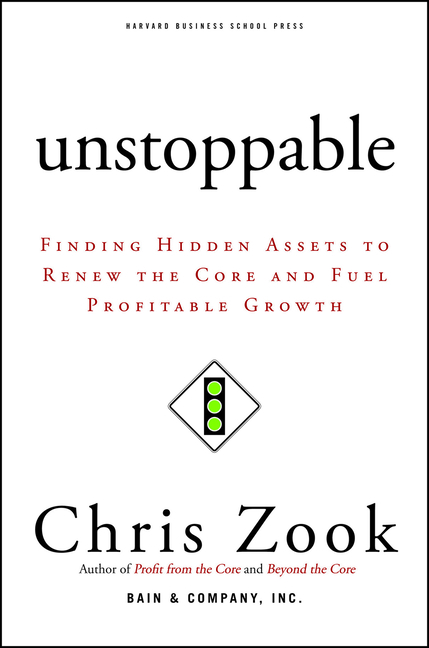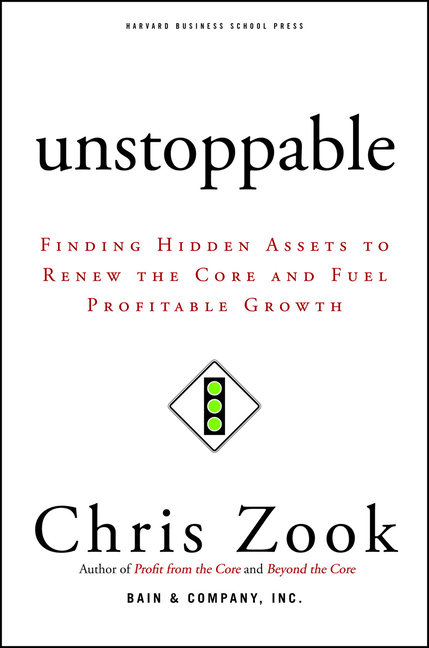Repeatability
We've spent a lot of time with Chris Zook. Not the man himself, but his work. When we were prepping the material for The 100 Best Business Books of All Time, Jack and Todd were still unsure of what the exact construction of the book would look like, but we were sure of one thing: Chris Zook had to be included in the book.
We've spent a lot of time with Chris Zook. Not the man himself, but his work. When we were prepping the material for The 100 Best Business Books of All Time, Jack and Todd were still unsure of what the exact construction of the book would look like, but we were sure of one thing: Chris Zook had to be included in the book.
To begin, Todd wrote a lengthy exploration of Chris Zook's business trilogy: Profit from the Core (co-authored by James Allen); Beyond the Core; and Unstoppable.



Market leadership feels good. The company grows. Employees are having fun. Shareholders are happy. At some point though, the growth curve flattens. The search for the next source of growth begins--and this is where the mistakes occur. Consider the numbers. Only one in three new product introductions is successful. The odds of creating growth through acquisitions are about the same. And finding partners and forming joint ventures only succeeds 20 percent of the time.The key to successful growth for Zook? "Business adjacencies [areas of expansion] are growth opportunities that allow a company to extend the boundaries of its core business by drawing on skills that already exist." Zook and Allen's new book, Repeatability: Build Enduring Businesses for a World of Constant Change, addresses how this can be done. For ten years they "looked at the three ways that companies grow (or fail to do so.)" And as they watched, they deduced "that simplicity, focus, and mastering the art of continuous change nearly always trump strategies of radical change or constant reinvention." In basic terms, get really, really good at something very, very simple. Then, repeat this refined process in an adjacent endeavor. The three principles of achieving this repeatability are developing a clear, repeatable well-differentiated core business; establishing a succinct set of "nonnegotiable" principles that drive every business decision; and integrating closed-loop learning into the strategy plan. While the first two principles are about establishing standards, the third is about the necessity for retaining some adaptability. "Many well-documented studies by business historians reveal how successful business models can breed the seeds of their own rigidity, lack of learning, and eventual decline through complacency, hubris, a lack of willingness to question basic assumptions, and other human foibles." So it becomes imperative to set up a system immediately for receiving feedback from customers and frontline employees. It's a no-brainer, Zook and Allen say, but this process is often missing from most strategic plans.
In one sense, the idea that methods to monitor and adjust the key elements of strategy of a business sounds so obvious as to be unnecessary to state. Yet our collective fifty years of doing strategy consulting has proved to us the opposite. It is the rare business that insists that every newly developed strategy includes explicit methods to monitor, test, evaluate, response, and adapt.Doing so, Zook and Allen assure, will improve the speed of your reaction time to the changing business landscape as well as to the competition. The authors end Repeatability with a list of 10 "conclusions" that are both provocative and pragmatic, as well as several appendices. The appendix that summarizes the Top Thirty Case Studies included in the book--these companies span a wide range from the frequently lauded IKEA, Nike, and Berkshire Hathaway, to the less commonly referenced Danaher and DaVita, as well as international brands like Li & Fung and Olam--is nearly worth the price of the book itself. As with all of Zook's books, he and Allen stay close to message in the same way he advises business to focus on what it is that they do best. And in fact, Zook and Allen state this intention about 40 pages into the book. "This book has a simple structure and an even simpler message. Hopefully, it is a metaphor for our topic of the power of simplicity in a world of escalating complexity, the silent killer of sustained and profitable growth." And that's exactly what they did with great success. Repeatability once again proves what a productive pleasure it is to spend some time with Chris Zook.




